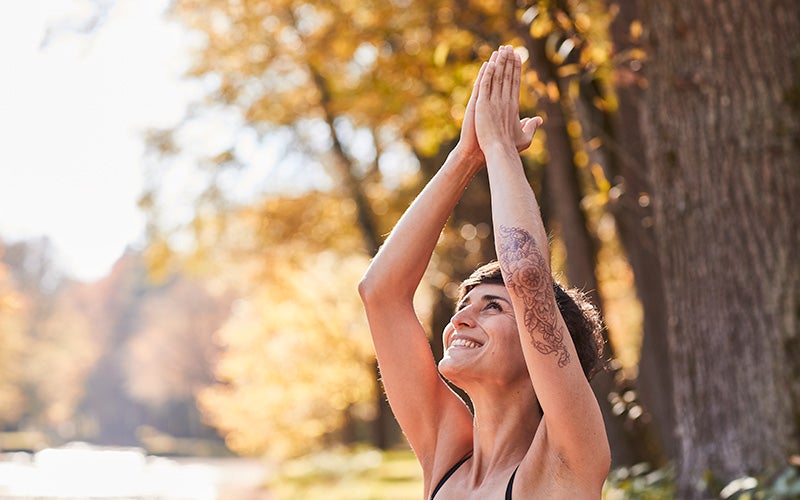5 Ways to Bring a Gratitude Practice to Your Daily Life
 ©jacoblund
©jacoblund
Sometimes, when we focus on all the things we want to improve or change, we take the positive things in our lives for granted. The best solution to this is practicing something called gratitude! It sounds simple, but gratitude has an enormous effect on your attitude and quality of life. We’ll tell you why expressing gratitude more often in your everyday life can lead to significantly better mental health – and helps you learn to appreciate the little things.
What Is Gratitude?
Did you know that gratitude makes you happier and can lead to more joy in life? It’s more than just saying “Thanks!” to the cashier at the grocery store giving you change back. Rather, it’s about the feeling of gratitude as an inner attitude.
When you feel grateful, you usually feel more appreciation and deep recognition for a certain condition or a material or immaterial gift. For example, you might feel grateful for both a gift you have received, as well as for the fact that this person has thought of you. The latter usually promises a much more lasting feeling of happiness.
Grateful people are happy with what they have. They pay a lot of attention to their fellow human beings and environment and reward a good deed by showing gratitude. Thus, gratitude can be the perfect remedy against frustration, envy, or anger.
However, this doesn’t mean that you should squash down or deny that you have other feelings. Negative emotions such as anger, stress, sadness, or listlessness are also part of everyday life and are completely normal. Gratitude is more about not letting yourself be permanently taken over by negative feelings, and listening more to positive emotions. It’s about putting your focus less on what makes you unhappy and more on what makes you happy.
Ask yourself, what are you grateful for today? Name three things that come to mind right away. They can be absolutely anything. A hug from a friend, a video that made you laugh, or a cup of coffee are all good examples. Do you need to think about it a little longer? Here’s another question: Do you often think about things or people you’re grateful for? If not, we recommend that you make a regular ritual out of asking yourself this question every day. This can be your first step on the path to a better quality of life.

Why is Gratitude So Important?
Without gratitude, you’re likely to focus more on things you don’t have instead of appreciating what you already do have. It’s not easy to feel content with that kind of mindset, because no matter how many successes you celebrate, as soon as you get what you want, you no longer appreciate it.
A lack of gratitude also has a negative effect on your relationships. If you don’t show gratitude to those around you, they won’t feel valued. A friend who has never heard you say “thank you” may think twice next time about dropping everything to help you out in a pinch.
Yet there are so many things in this world for which we can be grateful, like our health, family, friends and partners, our free time, or even our work. And one should never take things like access to food, clean drinking water, and shelter for granted.
And it can be helpful to appreciate bad experiences you’ve had in the past, because they’ve made you the person you are today.
Of course, we also want more than that. Wanting more is normal for us humans. If you look at Maslow’s hierarchy of needs, it becomes clear that as soon as you’ve fulfilled basic needs such as eating and sleeping, you naturally will long for more. And that’s a good thing! Developing and growing are essential for a happy and fulfilled life. But if you notice that you’re often dissatisfied, it can help to pause, consciously notice the little things in your life, and appreciate them more. It may lead you to realize that you’re better off right now than you thought. Need a few more reasons to feel gratitude in everyday life?
Reasons for More Gratitude
- You value your life and your fellow human beings more.
- You radiate satisfaction and positivity and appear more attractive and fun to be around to others.
- You can resist unnecessary distractions and temptations more easily because you need less and appreciate what you already have.
- You react more calmly to changes and stressful situations and strengthen your resilience.
- You develop a positive mindset and recognize more opportunities and possibilities even in difficult moments.
- You feel better overall and strengthen your self-esteem.
- You can more easily avoid constantly comparing yourself to others.
5 Simple Tricks for Your Gratitude Practice
Most of the time, gratitude rushes over us at a particular moment, like when someone pays us a compliment. This is a special feeling that you don’t necessarily experience every day. As soon as the moment has passed, we return to our normal everyday and the feeling fades too. A grateful attitude towards life, on the other hand, is more constant and can be learned with a little practice.
You may find it difficult to feel gratitude, especially if you are going through a challenging period in life. Find out the reasons you’re unhappy. Once you’ve discovered the triggers, the next step is to replace negative thoughts with positive ones. Here are a few tips that can help you get started:

#1 Keep a Daily Gratitude Journal
You can incorporate a new ritual into your daily routine and write down a few lines in a gratitude journal before going to sleep. You can include things like “Did I help someone with something today?” or “What challenge did I face today and what can I learn from it?” The task is mainly to review your day and ask yourself what you’re grateful for. This reflection helps you become aware of how well you are doing and internalize that there are things to be grateful for every day.
Our reading tip: Want to learn more about the benefits of a diary or journal and how you can keep one? Read this if you want to know how to journal but don’t know where to start.
#2 Practice Mindfulness
This leads us to the next point. If you write down positive experiences every day, you’ll become more mindful overall and perceive your surroundings and the people around you more clearly. The result: You can enjoy your everyday life more. Whether for a beautiful sunset, a delicious meal, or an energizing workout, let yourself consciously take the time to pause and be present for everyday moments instead of letting the day rush by.
Our reading tip: Learn more about the benefits of mindfulness with our article! Bring mindfulness into your life and see the changes unfold!
#3 Change Your Perspective
Have you only been paying attention to the things that aren’t going so well lately? It might be time to change your perspective. Don’t like your current job? Ask yourself what you get from it. Maybe you have nice, helpful colleagues or particularly flexible working hours. Don’t feel like doing your home workout anymore because it’s exhausting and you’d rather relax on the couch? Think about how good you’ll feel when you do follow through with your workout. Don’t lose sight of your why, and remember what you want to achieve with your workout.
Also ask yourself whether your listlessness is a phase or if you are really unhappy? If it’s the second, you might want to actively change the aspects of your life that aren’t meeting your expectations. You could try out a new sport that you might enjoy more, or look around for other jobs that are more in line with your expectations.
Need some ideas for your next home workout? Let our workouts inspire you. Whether you’re a beginner, more advanced, or a pro, there’s a workout for everyone!
#4 Gratitude Meditation
You’ve probably heard that meditation can help you feel better. If you’re not yet experienced at completely letting go of your thoughts, meditating can be a real challenge. But don’t worry! Gratitude meditation is much easier.
All you have to do is think of the things and people you feel gratitude for. Take a few minutes and find a place where you can be undisturbed. Think about the beautiful aspects of your life that you are grateful for. Observe how this makes you feel and say “thank you” inwardly. If you do this regularly, you’ll more easily focus on the positive things in your life.

#5 Create a Photo Album
A photo album full of beautiful experiences from your life shows you every day what you can be grateful for. A nice vacation, a graduation, your family, or your own wedding – it can be anything you associate positive feelings and memories with.
How Do You Express Gratitude?
Saying thank you costs nothing. Why then do we sometimes find it so difficult to show gratitude? The people around us are happy when we express our thanks, that’s for sure! A simple “thank you” signals recognition and appreciation to your counterpart. Everyone’s happy when their efforts are appreciated.
The good thing about it is that if you give other people the recognition they deserve, you’ll usually get the positive feedback in return. In addition, you hone your empathy and people skills. You put yourself in others’ shoes and recognize moments when someone is acting with good intentions.
These simple methods can help you communicate your feeling of gratitude to others:
#1 Say Thanks
Sounds logical! But sometimes we still don’t do it. You can start with simple things. Let’s say someone lets you go ahead at the register. Here, it’s appropriate to thank them out of politeness alone. You can use a trivial situation like this as an opportunity to notice how often you could actually say thank you throughout your day. This will automatically shift your focus towards your surroundings. The more often you say thank you, the easier it will be for you to express your gratitude, either verbally or through a gesture.
#2 Write a Gratitude Letter
Sometimes, when it comes to people who are particularly close to us and who have great significance for us, it can be difficult to put your own feelings into words. A gratitude letter can help you to organize your thoughts and write them down in peace.
First, think about who you want to thank? Your best friend, a family member, or maybe your partner? Maybe there’s a specific person in your life you’ve never really had the chance to say thank you to. Whether you actually send the letter is up to you. Just writing it helps you come to terms with your own emotional state and can increase your sense of happiness.
Want to express your gratitude with a gift? There’s something for everyone in our store – from smart cooking to healthy snacks to fitness supplements for a successful workout.
Summary
- Gratitude is the inner attitude with which you approach your everyday life. It allows you to focus more on the positive and learn to appreciate the little things.
- A grateful mindset can lead to more life satisfaction, happiness, and well-being.
- Methods for more gratitude include a gratitude journal, mindfulness exercises, or even gratitude meditation.
- You can express your gratitude by saying thank you even in simple, everyday situations or by writing a gratitude letter to an important person in your life.
More facts for better living from foodspring:
- 8 Tips for Your Self-Improvement Journey
- Self Love: Understand what it is, why it’s important, and find our 7 tips to boost yours! ❤️
- 7 rituals to bring your evening routine to the next level
- Natural mood booster tips for a clearer state of mind
Sources for this article
We at foodspring use only high-quality sources, including peer-reviewed studies, to support the facts within our articles. Read our editorial policy to learn more about how we fact-check and keep our content accurate, reliable, and trustworthy.
































